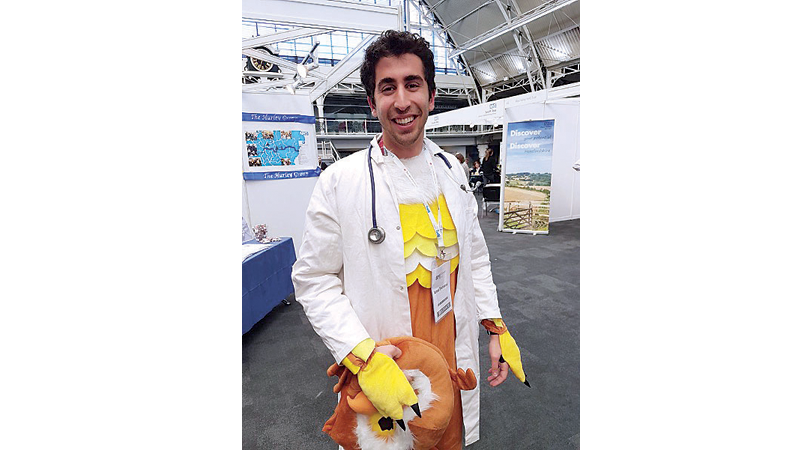

@lakshmioman
An App that came into existence out of sheer necessity is today a winner and Oman’s Dr Ahmed al Shahrabani who is currently working in UK as a respiratory doctor in the Covid wards over the weekends and as Co-Founder and CEO of Locum’s Nest during the working week is a winner at Forbes 30 under 30 Science and Health Care Europe Honouree. He is also an NHS Innovation Accelerator Fellow, selected as one of twelve candidates across the UK to deploy nationwide innovation in healthcare in an ethical and impactful manner.
Dr Ahmed explained to the Observer how it all started. “In 2016, Dr Nicholas Andreou, a colleague, and I founded Locum’s Nest and our mission was to improve the lives of doctors, nurses and allied healthcare professionals in their NHS work. The idea was to improve patient care and save the NHS billions of pounds. Today, we are working with over 40,000 healthcare workers across hundreds of hospitals and have the pleasure of working with a team of 30 inspiring and hard-working colleagues at Locum’s Nest.”
STORY OF LOCUM’S NEST
The idea did not work out overnight. The story of Locum’s Nest was born in Epsom St Helier, a hospital in south London, at the hospital where the co-founders and a few friends worked on the same ward.
“Every Friday, the rota manager would come to the ward and ask one of us to cover the afternoon shift on the following Sunday. If the consensus answer was ‘no’, then what followed would be a barrage of texts, emails, phone calls and bleeps to find cover as ultimately it is clinical safety affected. If no one was found through the full-time employees’ spreadsheet or the flexible worker volunteers, the rota manager would resort back to phone calls, emails, texts etc to a bunch of local recruitment agencies. Basically, it was a process that costs a lot of time and a lot of money; we didn’t like it as the clinicians, the core HR team was spending too many hours with very little luck in finding a doctor.”
So they thought there must be a better way of doing this, and as with other industries, the idea was born to cut out the middleman with technology.
“We spent all year working with the hospital. Asked to each other, ‘what should the solution look like?”
They built a free-to-use mobile application for doctors, which had features such as a built-in digital passport to allow doctors to cross hospital borders — they could add their specifications such as their specialty, credibility etc, and link it to various calendars and rosters. They would receive notifications of shifts that matched their requirements to a hundred per cent. What made the difference was that rather than being bombarded with all jobs available, the application filtered jobs that were only applicable to their skill set.
If this is how the app began five years ago the scenario has changed much. The platform now works with doctors and nurses, pharmacists, physiotherapists, and all other allied healthcare professionals.
“We have also expanded and are now working across borders and not just in England’’, pointed out Dr Ahmed.
Dr Ahmed followed his father late Dr Rasheed al Shahrabani, who had moved to Oman from the UK in 1990.
Dr Rasheed and a few of his colleagues were instrumental in forming Oman’s first Cardiology unit, which is still running today as the nation’s leading centre for heart disease.
Dr Ahmed is a student of British School Muscat. He received a Medical degree at Sheffield University in 2014. Since then, he has completed his foundation medical training between London and Surrey, where he is working today in the Covid-19 units.
“I chose to become a doctor as a result of my father. Seeing how he spoke to people with dignity and compassion and seeing how others spoke to him with respect and appreciation. I was always into the Sciences at school and loved understanding not just why things worked the way they did but crucially, how. It was the combination of the pathophysiology of diseases in conjunction with the importance of communicating with patients as humans that drew me to it. I firmly believe the art of medicine is 90 per cent communication and empathy, with the remaining 10 per cent being science.
“Anybody can learn a textbook inside out, but it’s how you deliver what you know to your patients that makes a good doctor. The art of communication always trumps science, and it was this that drew me to the profession. I’ve always liked engaging with people, learning about them, what’s important, what do they fear or dislike and striking that balance of what to say and when’’, Dr Ahmed explained.
ABOUT OMAN
“About Oman, I feel it has the potential to be a world leader in healthcare provision. The resources are there, and there are many highly motivated junior doctors and nurses. I would love to work with the Ministry of Health and discuss healthcare policy at a high level, what could be improved and where our strengths currently lie. It’s very important to me that we also look at healthcare delivery outside of Muscat, I was recently in discussions with the medical team on the island of Masirah and would love to complete a secondment on the island, working with the local population and resident doctors and nurses to improve patient outcomes on the beautiful island.
His formula for success is the same as his core principles at Locum’s Nest. He calls for tenacity, “simplify and re-simplify” be bold and quirky to be successful.
Oman Observer is now on the WhatsApp channel. Click here



